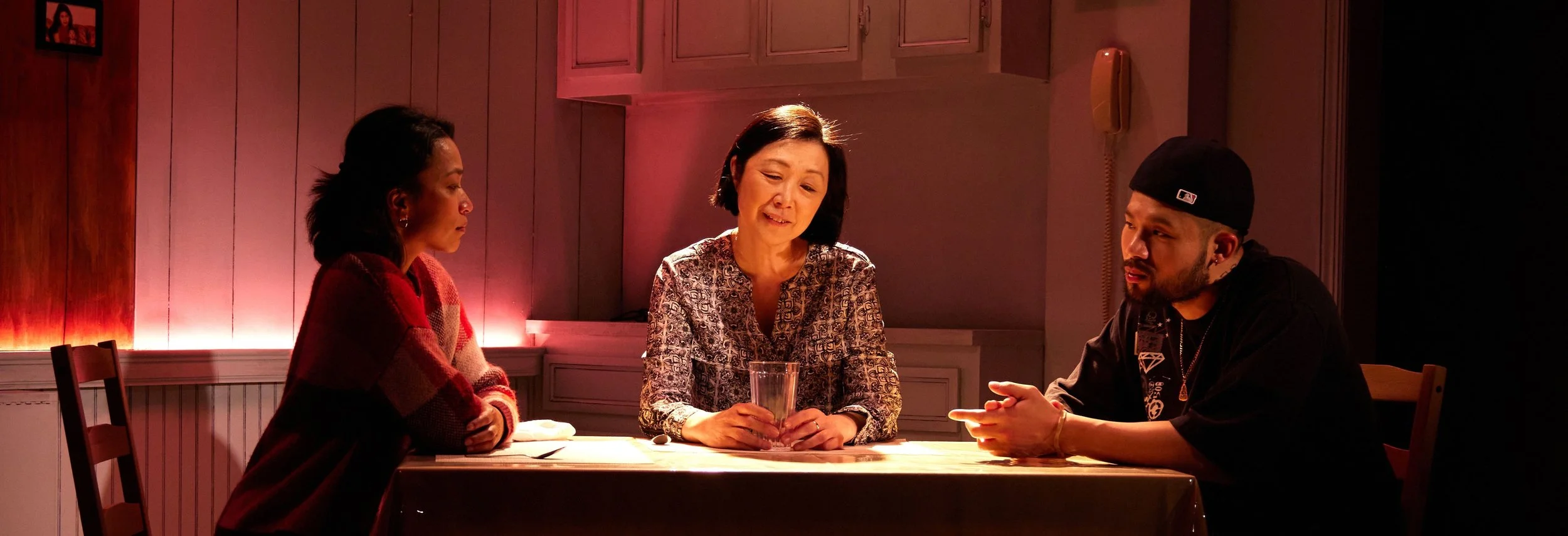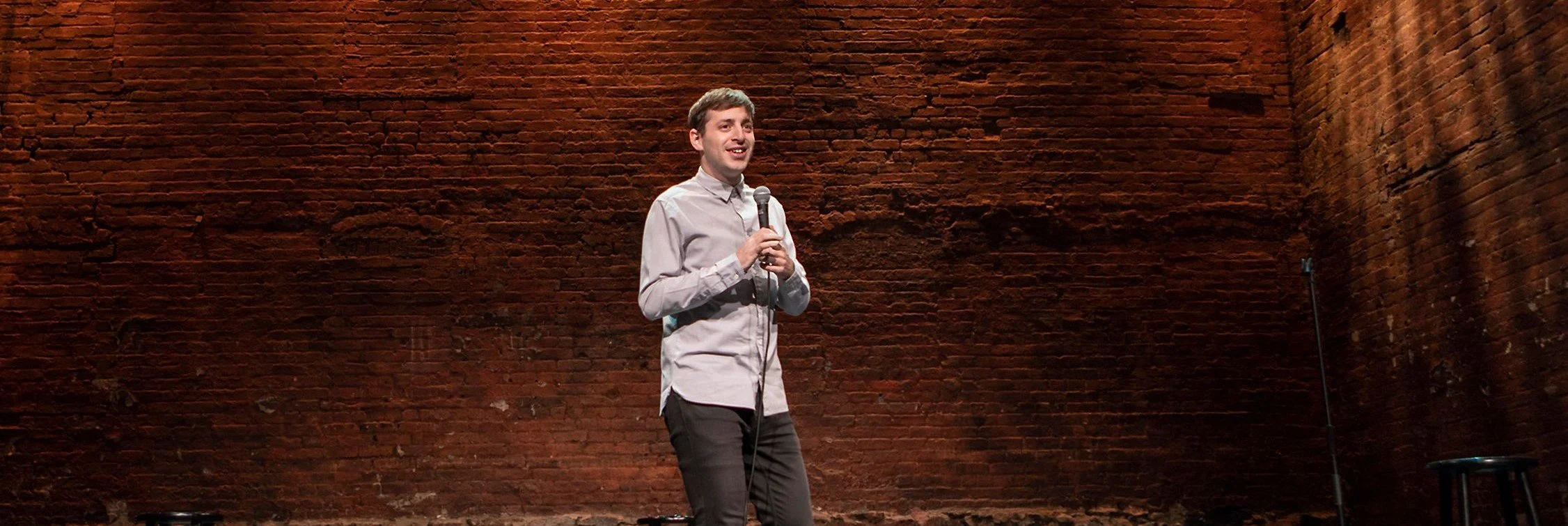When Edmond Rostand’s Cyrano de Bergerac opened in 1897, it was hailed not only for its poetry but for its elaborate sets—one for each of the five acts, from bakery to battlefield—and for its poetry and grandiose passions. Martin Crimp’s version of the story of unrequited love, produced and directed by Jamie Lloyd at BAM, has only the faintest glimmers of any exaltation. More often it’s simply disappointing.
Bloom
Alfred Hitchcock famously described the basis of suspense as a situation in which there is a ticking time bomb under a table. The audience knows it is only a matter of minutes in which the bomb will explode, and they sit on the edge of their seats in anticipation of the outcome. Applying this principle, Marco Antonio Rodriguez initially establishes a veritable minefield in his new play Bloom, currently running at the IATI Theater. In the totalitarian world in which the play is set, a mother has been ordered to kill her son, and if she does not do so within precisely one hour, unimaginable horrors will follow.
Citizen Wong
Richard Chang mixes history and fiction in Citizen Wong to tell the story of Wong Chin Foo, the nineteenth-century Chinese-American journalist, activist, performer, and lecturer who fought for equal rights for Chinese-Americans and to dispel pernicious, racist stereotypes about Chinese people and culture. Presented by Pan Asian Repertory, Citizen Wong is co-directed by Ernest Abuba and Chongren Fan and features a cast of six, with the actors playing multiple characters, including historical personages or those inspired by such. The work is ambitious and timely, explicitly drawing connections to the present-day rise in anti-Asian bigotry.
SuperHero
SuperHero began performances the day after a gunman opened fire aboard a rush-hour Brooklyn subway train, giving added resonance to its protagonist’s decision to eschew violence as a response to personal turmoil. The playwriting debut of actor Ian Eaton, SuperHero is an autobiographical coming-of-age story about an awkward, overweight boy growing up in the Harlem projects in the 1980s.
To My Girls
In his new comedy-drama To My Girls, playwright JC Lee adds to a subgenre of plays about gay gatherings in which groups of friends thrash out problems and settle old scores with comic bitchiness. Mart Crowley’s The Boys in the Band is the forerunner of them all; later touchstones include Kevin Elyot’s My Night With Reg, Chuck Ranberg’s End of the World Party and Terrence McNally’s Love! Valour! Compassion! Lee’s To My Girls, under the direction of Stephen Brackett, is a respectable entry, reflecting a sea change in racial politics and behavior.
Larry & Lucy
A teenage, runaway heroin addict with daddy issues and a former graffiti artist long past his glory days explore the borders of friendship and codependency in Larry & Lucy, a gritty little slice-of-life one-act spinning its wheels on the intimate basement stage at Theater for the New City. Playwright Peter Welch propels his title characters forward through a whirlwind couple of days in and out of Los Angeles while simultaneously pulling them back to their unhappy pasts via brief flashbacks woven throughout the piece. If the duo’s actions are at best unusual, and at worst highly unlikely or confusing, the offbeat performances and noir atmosphere conjured up by director Joe John Batista make for a trippy ride to the West Coast.
A Touch of the Poet
Written in 1942, Eugene O’Neill’s A Touch of the Poet was intended to be the first of multiple plays about the Irish experience in America. O’Neill’s cycle was never completed, and the play was produced posthumously, in 1958. The Irish Repertory Theatre’s revival, masterfully directed by Ciaran O’Reilly, is a gut-wrenching drama that focuses on the Irish American Melody clan in the Boston of 1828. Led by Con (for Cornelius) Melody (Robert Cuccioli), a ne’er-do-well immigrant and inn owner who recites Lord Byron’s poetry, most of the characters live in a world full of delusions.
Heartland
Hope blooms even in the darkest and cruelest of times in Heartland, by Gabriel Jason Dean. The story pairs two unlikely geographical places: Omaha, Nebraska, and Afghanistan. Geetee (Mari Vial-Golden), is an Afghani orphan who was displaced by war and adopted by Harold (Mark Cuddy), an Afghani scholar who teaches at the University of Nebraska. She returns to her homeland as an adult to teach at Blue Sky, a school for girls. There she meets Nazrullah (Naz, for short), a math teacher at the school.
What You Are Now
Insights into Cambodian identity and immigrant experiences are the strongest thread running through What You Are Now, Sam Chanse’s drama at Ensemble Studio Theatre (EST) in which a young neuroscientist sees new research on trauma-related memory as a way to finally heal her mother, a survivor of the Khmer Rouge genocide in 1970s Cambodia.
This Space Between Us
This Space Between Us contains the opposite of an 11 o’clock number. The nonmusical scene late in the play is a showstopper all right, though not in the rousing good sense. Rather, all action and dialogue literally stop while two characters stand over an air mattress as it inflates. It lasts ... well, however long it takes an air mattress to inflate, which may only be about a minute but seems a lot longer, since the audience has to sit there and wait out this unnecessary moment in a show that has already worn out its welcome.
Sandblasted
Before the play Sandblasted even begins, it grabs the audience’s attention: They enter the theater to see a stage covered with sand—lots and lots of sand. Curiously, this sandy location appears to be indoors, as the set also includes a window on one side of the stage and doors on the other two. The play itself, however, may not stir the audience’s attention or curiosity—at least not for the full hour and 40 minutes (without intermission) of its running time. While Sandblasted features impassioned performances and some lovely two-person scenes, it tends toward the talky and abstruse.
Prayer for the French Republic
Issues of Jewish identity, religion, heritage and oppression are given a fresh spin in Joshua Harmon’s Prayer for the French Republic, a work of considerable length and intellectual heft. Harmon has set his drama in France, America’s oldest ally, which shares its values. Although it is a country closer geographically and emotionally to the harrowing experience inflicted on Jews by World War II and the Holocaust, it stands in for the United States as well. Incidents of anti-Semitism have increased in both countries in the last decade.
The Daughter-in-Law
D. H. Lawrence wrote The Daughter-in-Law in 1912–13, at the age of 27, around the same time as his novel Sons and Lovers. The play’s first production came posthumously, in 1967. There have been very few productions since, one of which was by the Mint Theater Company, in 2003, fulfilling its mission to “find and produce worthwhile plays from the past that have been lost or forgotten.” Now Martin Platt, who directed that production, again takes the reins for the company’s revival of The Daughter-in-Law, currently playing at City Center Stage II.
The Merchant of Venice
When most people think of Shakespeare’s The Merchant of Venice, it's Shylock who springs to mind, not the titular merchant. As a Jew in a Christian city-state, Shylock is an outsider; as a moneylender in an economy that reviles usury, he’s a pariah. Director Arin Arbus has chosen John Douglas Thompson, one of the most accomplished classical actors of his generation, as Shylock in her modern-dress production at Theatre for a New Audience (TFANA). Thompson, reportedly the first Black actor to play Shylock professionally in New York, finds music even in the most acidic passages of the Bard’s rhetoric; his nuanced performance explodes at crucial points, with moral indignation outstripping self-pity.
Wolf Play
There have been plays affirming LGBTQ people’s fitness as parents. There have been plays where child characters are played by puppets, and stories in which a child who feels different identifies as some type of animal. Boxing has been used as a metaphor, and there have been productions with lots of props and scenery that are upended by the final scene—one that comes to mind, Blasted, was staged at Soho Rep, whose new show, Wolf Play, includes all these things.
Just for Us
Despite Alex Edelman’s opening caveat that “my comedy barely works if you’re not a Jew from the Upper East Side,” he is one of the rare, masterful stand-up comics who can “cast out” and then successfully “reel back in” a diverse audience. He can take his monologue way off-topic, on a tangent that itself could be a stand-alone show. Although the thrust of Just for Us is his attendance at a white-supremacist gathering, along the way he signs and mimics the distress of a gorilla at Robin Williams’s death (the gorilla really grieved), then quips that Brexit should be called “The Great British Break-Off,” and lovingly, yet mercilessly, spears his family, their Hebrew names, his brother’s Winter Olympics prowess as part of the Israeli skeleton team, and his Orthodox Jewish parents’ finessing of Christmas (including a decorated tree in the garage) to comfort a bereaved Christian friend.
Selling Kabul
Selling Kabul, Sylvia Khoury’s play currently running at Playwrights Horizons, is significant and timely. Although written in 2015, the drama’s focus on the collateral damage of the pullout of U.S. forces in Afghanistan is even more urgent in light of President Biden’s complete withdrawal three months ago. Significant, timely, and urgent do not, however, necessarily make for great theater. To its credit, Selling Kabul does not minimize the political and ideological concerns, but it offers an impressively riveting, suspenseful, and deeply moving portrayal of four complex individuals caught up in the sweep of national turmoil.
The Lanford Wilson Project: “The Mound Builders” and “Sympathetic Magic”
Lanford Wilson’s 1975 play The Mound Builders centers on an archaeological excavation in Illinois of a pre-Columbian civilization, a conceit rich in metaphor and suggestion, and expressed in often-lyrical language. (The mounds in question refer to the earthworks constructed by the early inhabitants of the area.) The historical reach and resonance of the concept is combined with the claustrophobia of domestic dysfunction: the play was described in the New York Times review of the original Circle Repertory Company production as “an epic in the guise of a family drama.”
Cullud Wattah
Water is an essential part of life. It helps maintain bodily function and provides nutrients and sustenance for plants and animals. It seems unfathomable that life can exist without water, yet that is the reality for the citizens of Flint, Mich. Erika Dickerson-Despenza’s new play, Cullud Wattah, addresses the pollution of the city’s water system and how it has affected the citizens. Cullud Wattah also focuses on the disparity and inequities that prevail in cities with a majority population of minorities.
Morning Sun
Morning Sun by Simon Stephens is a multigenerational play about a mother, daughter, and granddaughter. Most of their story, both set in and serving as an homage to New York City, has been told before: mother-daughter conflicts, failed love affairs, and childhood friendships that don’t stand the test of time. Stephens has crafted fast-paced, staccato dialogue that moves effortlessly through decades to tell their story.


























